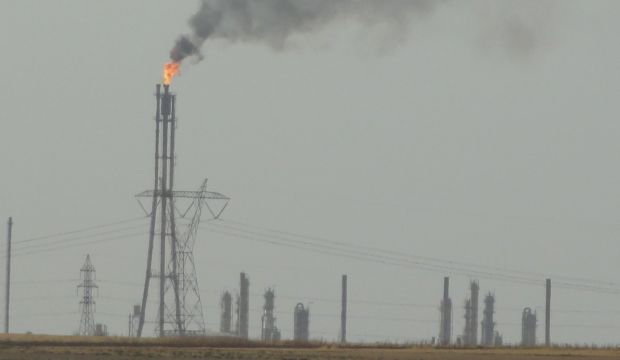
A picture taken on July 1, 2014 shows a North Oil Company gas field located near a checkpoint held by militants of the Islamic State of Iraq and Syria (ISIS), some 30 kilometres southwest of the disputed Iraqi city of Kirkuk. (AFP Photo/Marwan Ibrahim)
London, Asharq Al-Awsat—The Islamic State of Iraq and Syria (ISIS) is preparing to seize one of the few remaining major oil production centers in Syria not under its control, according to Syrian opposition officials.
“ISIS is already in control of more than 60 percent of Syria’s oil, with a total production rate of 180, 0000 barrel per day” and now plans to seize facilities in the northern province of Hassakah, an official from the Ministry of Energy in the interim Syrian opposition government, Yamin Al-Shami, told Asharq Al-Awsat.
Having seized control of the majority of oil fields in Raqqa province, in central Syria, and Deir Ezzor province, along the Iraqi border, ISIS is preparing to mobilize fighters in a new push towards the town of Rmelan, home to the largest oil fields in Hassakah. Rmealn is under the control of Kurdish People’s Protection Units, or YPG.
Shami warned that oil production constitutes a significant source of revenue for ISIS, adding that the Islamist militant group is able to sell a barrel of crude oil for around 18 US dollars. Brent crude, a global benchmark, currently sells at around 107 US dollars.
Oil is transported from ISIS-held areas with the help of local and foreign brokers, Shami said.
Despite its recent advances in Iraq, ISIS has been unable to take control of oil resources comparable to those it holds in Syria, and its recent attempt to capture the key Baiji refinery was successfully deterred by Iraqi forces. But Iraq’s oil infrastructure is far from secure, and there are frequent reports that huge amounts of crude oil are being smuggled out of the country by militants.
“Militant groups, along with ISIS, are stealing crude oil from fields near the Hamrin mountains” in northeastern Iraq, a local administrative official, Shallal Abdool, told Asharq Al-Awsat.
“Kurdish Peshmerga forces that control the area have seized more than 50 tankers loaded with stolen crude oil,” he added.
When asked about the destination to which oil is being taken, Abdool said: “There are many sides inside and outside Iraq that buy crude oil . . . and there are smugglers and brokers in Iraq who buy it for a cheap price in order to sell it abroad.”
Valerie Marcel, of London-based Chatham House think tank, said: “Fighters from ISIS can sell oil on the black market to buyers from Turkey, the Kurdistan region and Iran.”
“ISIS’s use of temporary refineries allows them to sell oil more easily.”
But, pointing to the fact that oil smuggling has been a problem for decades, others played down worries about ISIS’s oil activities.
“Oil smuggling operations from these sites exist and have been taking place for a long time before ISIS took over Nineveh province,” the governor of Salah Al-Din province, Ahmed Abdullah Al-Jubouri, told Asharq Al-Awsat.
Layal Abu Rahal contributed reporting from Beirut. Dalshad Abdullah contributed reporting from Erbil. Najla Habriri and Mina Al-Droubi contributed reporting from London.

Trackbacks/Pingbacks